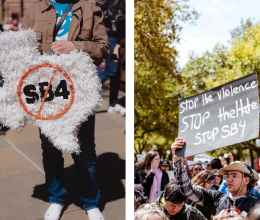
WASHINGTON — The American Civil Liberties Union of Texas, the ACLU, and Center for Gender & Refugee Studies filed a federal lawsuit today challenging the Trump administration’s gutting of asylum protections for immigrants fleeing domestic violence and gang brutality.
At issue are new “expedited removal” policies put forth by Attorney General Jeff Sessions that instruct asylum officers to “generally” deny such claims — calling them purely “personal” — as well as apply erroneous legal standards, and ignore contrary federal court precedents. The policies undermine the fundamental human rights of women, contradicting decades of settled domestic and international law recognizing gender-based persecution as a basis for asylum. They also impermissibly undermine claims involving gang violence.
“This is a naked attempt by the Trump administration to eviscerate our country’s asylum protections,” said Jennifer Chang Newell, managing attorney with the ACLU’s Immigrants’ Rights Project. “It’s clear the administration’s goal is to deny and deport as many people as possible, as quickly as possible.”
The Trump administration has been open about its goals to deport immigrants and asylum seekers without due process, or any process at all. It has called for immediate removal of individuals arriving in the U.S. without further consideration of their claims, by making it harder for asylum seekers to meet threshold standards.
“Our plaintiffs, like many others, are fleeing horrific persecution in their home countries,” said Thomas Buser-Clancy, staff attorney at the ACLU of Texas. “We will continue to defend asylum seekers, including victims of domestic abuse and gang violence, against the administration’s unlawful attempts to eliminate the humanitarian protections they are due.”
U.S. law requires that, at a minimum, any newly arrived immigrant who expresses fear of return to their home county be given a screening interview with an asylum officer to determine whether they have a “credible fear of persecution.” Those who pass the credible fear interview are taken out of the expedited removal system and can pursue their asylum claims in full trial-type hearings in immigration court.
The plaintiffs in this case include women who have endured extensive persecution in the form of sexual and physical violence. Fearing they would be killed, along with their young children, they sought refuge in the U.S. But under the new policies, even though government officials found the accounts credible, they concluded the women did not have a “credible fear of persecution” and ordered them to be sent back to the countries where they face grave harm.
To protect their safety, pseudonyms are being used. Plaintiffs include:
- “Mina” escaped her home in Honduras after suffering a vicious attack and receiving death threats by a powerful drug-trafficking gang. Gang members targeted Mina and her family after her husband and father-in-law helped a friend escape when the gang was trying to kill him. After murdering her father-in-law and threatening to kill her husband, gang members beat Mina so badly that she could not walk the next day. Her attackers told her they would rape her and mutilate her body if she did not leave town. Mina and her husband fled to the U.S. and sought asylum.
- “Maria,” a recently orphaned teenager, fled her home in El Salvador to escape a forced relationship and sexual violence at the hands of a gang member nicknamed “F.” When Maria’s brother-in-law, a member of the same gang, began using her deceased mother’s house as a gang gathering place, Maria stood up to him because of her strong Christian faith. After she asked her brother-in-law to leave, F. threatened her. He later attempted to sexually assault her days before she fled to the U.S., taking only the clothes on her back.
- “Grace” fled Guatemala to escape her abusive partner and his violent gang member sons from a previous relationship. He repeatedly beat and threatened to kill her and her children throughout their 22-year relationship and after she tried to leave him. He also sexually assaulted her and her daughter over many years. Grace is part of an indigenous group that is discriminated against in Guatemala by non-indigenous “Ladinos.”
“The Trump administration is violating U.S. immigration law, international refugee law, and our Constitution,” said Eunice Lee, co-legal director of the Center for Gender & Refugee Studies. “It’s putting the lives of our plaintiffs and thousands of asylum seekers in grave danger.”
The case, Grace v. Sessions, was filed in federal court in Washington, D.C. Co-counsel are the ACLU of Texas and ACLU of D.C.







